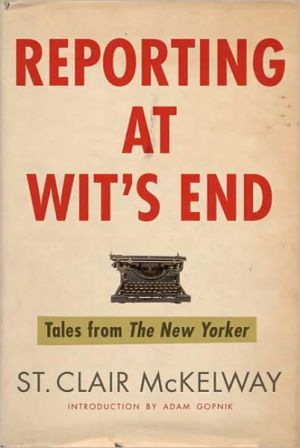

 |

|

The average rating for Reporting at Wit's End: Tales from the New Yorker based on 2 reviews is 4 stars.
Review # 1 was written on 2011-10-09 00:00:00 Lance dickson Lance dicksonOnce upon a time, and a very good time it was, there was a magazine called The New Yorker that published superb writing and made money doing it. That day, I fear, has passed; the magazine probably doesn't make money and I think its *superb* writing is thinner on the ground than once was the case. I am deeply grateful that it still exists and does all the very, very good publishing that it does. But oh me, oh my, for the times when A.J. Liebling, Joseph Mitchell, and St. Clair McKelway were simply among the talent pool, and not standouts! This collection of McKelway's best pieces of character-driven, crime-reporting pieces from the 30s to the 60s illuminates one of the old New Yorker's best gifts to us, its future: Clear, lucid, beautiful prose about moments in time, people in medias res, events not worthy of Historical Record but too...too...cool? weird? off-kilter? INTERESTING...to miss out on knowing, however briefly. It's a piece of Americana that the magazine doesn't do so much of anymore, though it's by no means a vanished idea in those not-so-hallowed pages anymore. It's just amazing to me how good The New Yorker remains, in this wildly different landscape from that of its heyday. When I got my copy of this elephantine tome, I quailed at the sheer bulk of it. I self-impose a duty to read books that I review twice. Anything that a writer has spent time, sweat, and possibly money on creating, I can't justify responding to in writing with a glancing blow, a negligible investment of one trip through, that will no doubt leave many incomplete and unsatisfied crannies unexplored. THIS book, I thought, *has* to be the exception! 1,240 pages, if read twice?! AAARGH! I loved it all. I can't tell you to read it twice, I don't think most people would listen, but I can tell you that Adam Gopnik, the present-day New Yorker writer who edited the collection, chose very wisely and you will not find your attention flagging. I myownself love the piece "Firebug-Catcher" the best of them all for its bygone Brooklyn setting. I feel very, very sure that any LT member who procures this book will find a lot of joy in reading it because of its literary merits, because it's a glimpse into a past as dead as ancient Rome and just as full of fascinating characters, and most of all because it's just great value for money spent. Member rocketjk uses door-stoppers like this as "between" books, ones he reads a piece out of between other, shorter books, and that is just about the perfect way to read Reporting at Wit's End. An aside: Bloomsbury USA, the publishers of this book, are celebrating their tenth anniversary. Buy their books. They're a wonderful, wonderful publisher of terrific books: Jonathan Strange and Mr. Norrell, The Art of Losing, Diet for a Hot Planet, on and on. Show 'em some love with your dollars, and enable them to keep bringing us the good books they do. |
Review # 2 was written on 2010-03-01 00:00:00 Ton Tonov Ton TonovSome great pieces in here, particularly "Mr. 880," (his FBI file number) the one about a counterfeiter who eludes the FBI through...I don't know what, exactly, for nearly a decade. He's not that wily (unlike the wily Wilby, an expert accounting fraudster), and his money says "Wahsington" on it, which you'd think would be kind of a giveaway. Maybe it's that he made only dollar bills and not that many of them. In any case, I am not going to put this up there with my Liebling books for memorability; they're maybe a half-step below--something lacking in the lowlife zest, maybe, that doesn't give me a lot of rereading value. The clarity and detail are exemplary (his mini-history of forgery in the "Mr. 880" chapter is a little masterpiece), but there's a lack of...glee in the whole thing that makes it, for me, excellent reporting but not literature. And then his whole "madcap" escapade, "The Edinburgh Caper," goes on and on and on; I thought it was about his drinking problems, but Marc Weingarten's LA Times review, which thought that bit waaay more fun than I did--"a sprawling and brilliant internal monologue that unspools in a wild shaggy dog story as improbable as it is gripping"--suggests it's really therapeutic and about his mental-health problems. Either way, I found it endless and not that fun. But the closer, about a serial impostor who could not and would not stop (there's a mini-saga with this exiled Afghan princess in 1922 where he becomes her White House escort after claiming to be the "Naval Liaison" that cries out for one of those goofy true-crime treatments), is an endlessly astonishing tale. So, those 100+ pages on Edinburgh aside, a lot of good stuff here. Still, I prefer McKelway's out-of-print collection, True Tales from the Annals of Crime and Rascality, which contains the Father Divine piece and pretty much all of the good pieces from this collection. |
CAN'T FIND WHAT YOU'RE LOOKING FOR? CLICK HERE!!!